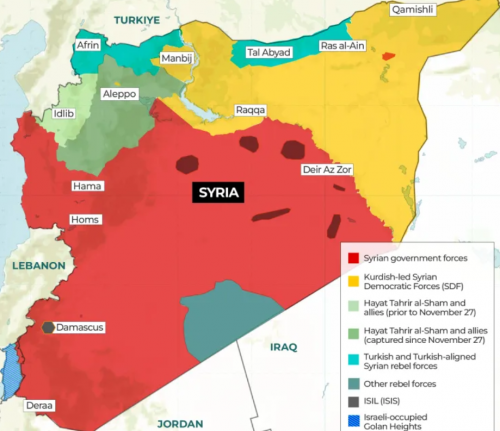The Post-America New World Order
This week a terrorist army ran amok in Syria.

This didn't happen in a vacuum. Our government had something to do with it.
Under President Barack Obama, the U.S. government secretly poured billions into a covert operation designed to topple Bashar al-Assad’s government. The CIA’s Timber Sycamore program, one of the agency’s most expensive undertakings, at its peak, funneled $100,000 per Syrian militant trained—many of whom would ultimately fight under the banner of Al-Qaeda-linked factions.The full extent of Washington’s complicity was laid bare in leaked cables, which revealed a startling admission from Jake Sullivan, then-Deputy Chief of Staff, to Hillary Clinton in 2012: Al-Qaeda “is on our side in Syria.” Brett McGurk, the National Security Council’s coordinator for the Middle East, later labeled Idlib as “the largest Al-Qaeda safe haven since 9/11.”
Turkey is also heavily invested in regime change in Syria.
It's becoming increasingly clear that America can cause chaos in the world, but not actual control.
The liberal, rules-based order that had shaped the rules of the game since World War II was already on its heels. It had proved wholly unable to prevent, punish or halt Russia’s aggression against Ukraine, a violent war in Sudan threatening tens of millions with famine, the rise of authoritarian China and its threat to freedom of navigation in the South China Sea, or Israel’s large-scale violence against civilians in Gaza and Lebanon, to name just a few. The rules of that system had always been applied inconsistently, but now they seem to no longer apply at all to some. Many around the world had already lost faith that they benefited from it. It was ripe for a reckoning...
The defenders of the dying rules-based international order share some of the blame for this unfortunate shift. The opening for a new world order emerged because the old one failed to deliver. President Joe Biden made much of protecting and preserving the existing system, but he, too, perpetuated only an a la carte approach. If you call out and punish your enemies’ violations of international rules but not those of your friends, you’re reinforcing favors to favorites, not rules. Much of the “global majority,” meaning the bulk of humanity (85%) that isn’t ethnically white and Western, saw this Washington-led order as hypocritical and designed to keep the West in control.
The international rules-based order was set up by Americans, for Americans. Well, wealthy Americans anyway. So a collapse of this world order will inevitably hurt Americans more than most other nations.
The best example of the decline in America's influence was Trump's threat against the BRICS nations this week.
Over the weekend, president-elect Donald Trump again threatened to use tariff warfare as his bargaining chip of choice, just days after targeting Mexico and Canada. This time, he floated the idea of imposing a potential 100-per-cent tariff on the BRICS countries if they push for the creation of an alternative BRICS currency or rally around a new international trading currency to replace the U.S. dollar. These threats reveal a deep concern within the Trump administration that the U.S. dollar’s dominance in global affairs is waning. And they are right to be worried.Since the end of the Second World War, the U.S. dollar has reigned supreme in international economic affairs. Its dominant reserve currency status emerged under the Bretton Woods system, where it became the world’s primary hard currency. This dominance only intensified after the collapse of Bretton Woods in 1973 and the shift to fiat currencies – those issued by the state but not backed by a commodity, such as gold or silver. Today, the U.S. dollar remains the cornerstone of global trade and finance, with around 60 per cent of all foreign currency reserves held in dollars. Remarkably, while the U.S. accounts for just 10 per cent of global exports, more than 50 per cent of global exports are invoiced in dollars.
This arrangement has brought significant benefits to the United States. Foreign governments typically maintain their dollar holdings in safe U.S. assets, principally U.S. Treasuries, creating a steady stream of external demand for U.S. government debt. This demand has helped to allow the U.S. to sustain public debt levels around 100 per cent of GDP while continuing to borrow at relatively low interest rates. Today, roughly one-quarter of U.S. public debt is held by foreign residents. Economists refer to this advantage as an “exorbitant privilege,” and it’s a privilege no country would want to lose.
Trump's threat is not a sign of strength. It's a sign of weakness, and it's not even a threat that Trump can back up. With Russia already barred from the dollar-based financial system (and China on it's way to joining them), it's an empty threat.
It's also likely to backfire.
“Donald Trump’s threats against countries that stop using the dollar are quite ridiculous,” he opined. Emphasizing that such tariffs would double the prices of essential goods in the United States...Sapir believes Trump’s aggressive rhetoric might accelerate efforts by BRICS nations to reduce reliance on the U.S. currency, risking unintended consequences for the global financial system.


Comments
The map of Syria given by Simplicius --
gives a different picture:
https://simplicius76.substack.com/p/syrian-crisis-analysis-saa-on-verge
And here's Mark Sleboda on Syria:
So, putting the pieces together, I'm guessing that the Syrian Army is poorly paid, Syrian society is corrupt, US sanctions are in fact a problem for Syria, and it's hard to tell the extent to which Russia cares about Syria while Syria's best ally Iran girds for a war with the United States. I remember reading somewhere that Bashar el-Assad didn't initially want the job of ruling Syria, and feels obliged to do what he does because, you know, Islamic theocracy would be the alternative. In short, the State Department sees Syria as low-hanging fruit. True?
"The proletariat needs to become like a family" -- Zoya
Pepe Escobar is frightened
"The proletariat needs to become like a family" -- Zoya